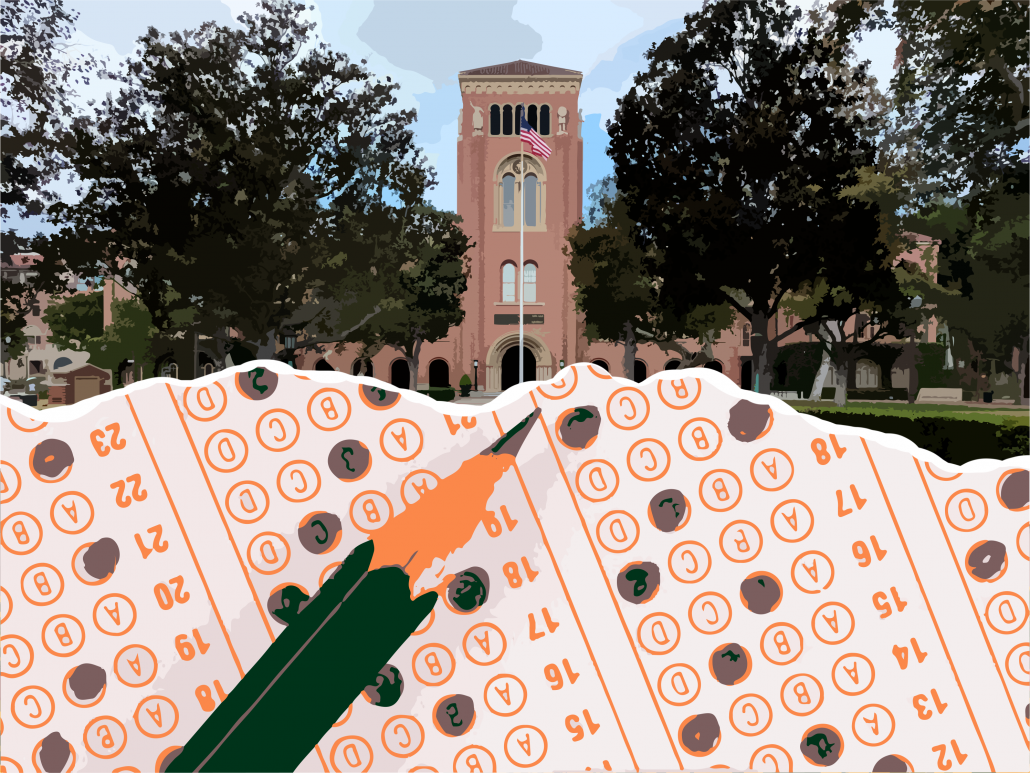USC should adopt a test-optional admissions policy

As coronavirus outbreaks have prompted a standardized testing slowdown, hundreds of colleges and universities have suspended their test score requirements. This test-optional movement is more than just pandemic-related pragmatism: Over the last decade, it has rapidly gained acceptance by prestigious universities, such as the University of Chicago and the University of California system. In fact, a judge ruled yesterday that the University of California must suspend its testing requirement for admissions and scholarships.
While USC has already waived testing requirements for the Class of 2025, it is time to move toward a permanent test-optional policy.
As the University strives to welcome Trojans of all races and backgrounds, it ought to reckon with the racist and elitist roots of standardized testing in America. The SAT, created by known eugenicist Carl Brigham, was created to argue that people of color were responsible for the deterioration of American intelligence. Admissions test expert Jay Rosner writes that even in the late 1990s, SAT designers chose test questions based on whether more white students than Black students answered them correctly.
While it may be wrong to evaluate an initiative solely by its origins, it is equally wrong to ignore the glaring racial achievement gap in SAT and ACT scores. For SAT combined mean scores between 2007 and 2019, white and Asian American students averaged in the 1000s, while Black and Latinx students averaged in the low 900s. For ACT composite scores between 2007 and 2016, white and Asian American students averaged above 22, whereas Black and Latinx students hovered below 20.
When this scoring disparity has lasted for at least a decade, dismissive sound bite answers such as “hard work” and “intellect” are no longer acceptable explanations. The more accurate explanation is that standardized testing actually gauges access to academic resources, not intelligence.
Wealthy (and usually white) students tend to prepare for standardized tests by employing private tutors and attending entrance exam boot camps, which grant not only greater exposure to test questions but also psychological preparation for the testing environment. Low-income students cannot afford these luxuries, and public education tends to offer few test-prep supplements. When considered in the context of the intersection between racial and economic privilege, what becomes clearer and clearer is a standardized testing system that categorically favors certain demographics over others.
The socioeconomic inequity built into standardized testing should prompt University administrators to do some serious self-reflection. The University mission statement asserts that “USC is pluralistic, welcoming outstanding men and women of every race, creed and background.” In this light, standardized testing’s structure and implications are already in direct conflict with the University’s stated values.
Opponents of the test-optional movement counter that racial inclusion cannot come at the cost of academic rigor — but this either-or mentality is fundamentally flawed.
Test scores are actually a limited predictor of college success. A 2020 University of Chicago study found that students’ high school GPAs were five times as strong as ACT scores in predicting college graduation. The researchers explained that GPA assesses a much wider range of skills, “including effort over an entire semester in many different types of classes, and demonstration of academic skills through multiple formats.”
The evidence checks out: The vast majority of college students will never again get tested on how quickly they can bubble in answers for trigonometric equations or reading comprehension sets, but they will get tested on how well they can create functional and sustainable solutions to real-world problems. Standardized tests may claim they test critical thinking, but they are clearly inferior assessments.
Perhaps removing testing requirements will empower admissions officials to place greater weight on factors such as family and community commitment, employment and cultural awareness. These metrics could potentially allow racially and economically disadvantaged students to shine where others cannot. As USC recovers from admissions scandals and attempts to shed its “University of Spoiled Children” reputation, emphasizing these factors could potentially be a step in the right direction.
USC ought to join its fellow universities in deemphasizing standardized testing in the admissions process. A test-optional policy may not be a silver bullet against inequitable admissions practices, but it is a good first step towards leveling the educational playing field.

